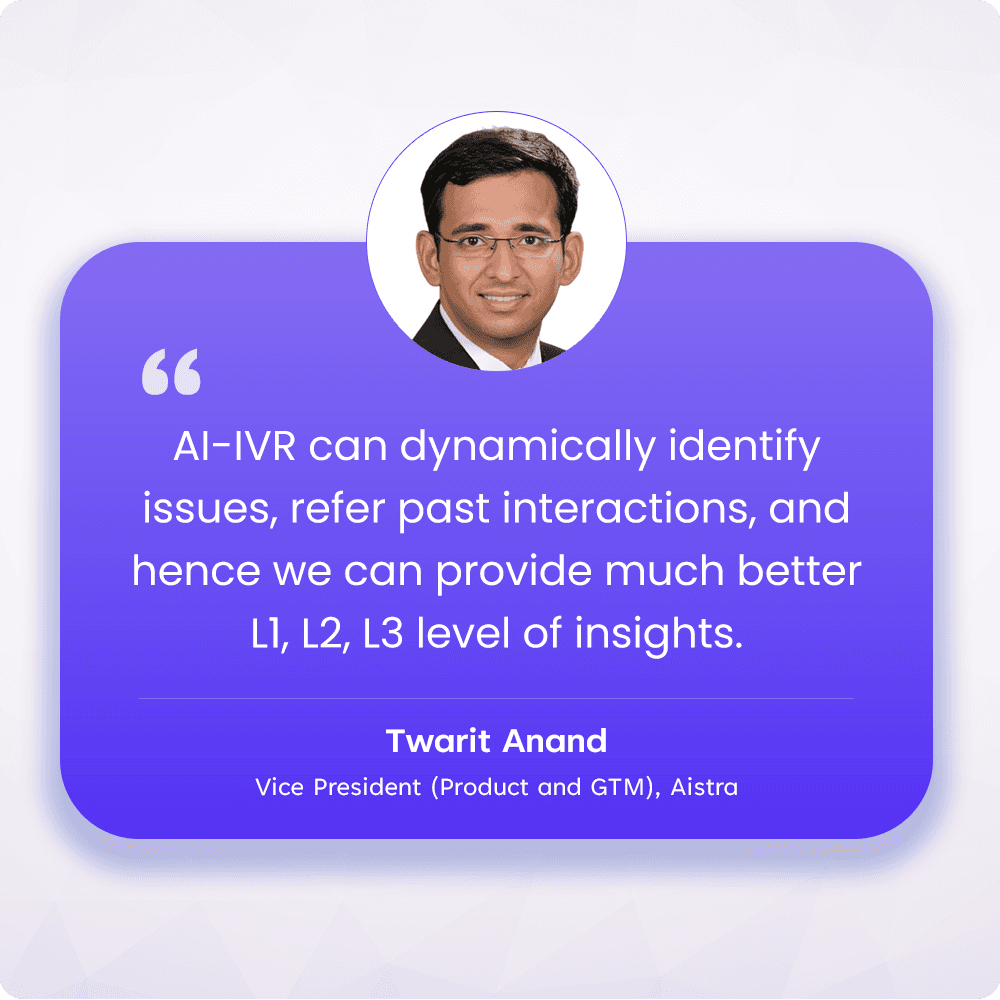Nov 16, 2024
6 Min

DeepTalk Team

Introduction:
If you’ve ever called customer service and been stuck navigating an endless maze of automated options—press 1 for sales, press 2 for support, and so on—you’re familiar with IVR, or Interactive Voice Response. IVR systems are the automated phone menus that direct you to the right department or service, designed to streamline customer support. However, while these systems have been a staple in customer service for years, their rigid, menu-driven approach often leads to frustration, long wait times, and a less-than-ideal experience for customers.
But there’s good news. With the rise of AI-powered conversational IVR systems, the customer service experience is evolving to a new level. AI is replacing these outdated, frustrating systems with something smarter, more intuitive, and more personalized. In this blog, we’ll explore how AI is reshaping IVR technology, improving customer satisfaction, and paving the way for a more seamless, customer-centric future.
The Limitations of Traditional IVR Systems
For years, IVR systems have been the standard for automating customer service calls. However, these traditional systems often frustrate customers for several key reasons:
Frustrating Menu Trees: Customers are forced to navigate a labyrinth of options. Press one for sales, press two for support, and so on. Each option leads to more options, making it a complex and time-consuming process just to get to the right department.
Long Wait Times & High Dropout Rates: With static menus, customers often end up waiting in long queues or, worse, hanging up in frustration after not being able to find the right option. This not only affects the customer experience but also increases the likelihood of losing valuable customers.
As businesses grow, these limitations become more evident, and companies need to rethink their approach to customer service.
How AI-Powered Conversational IVR is Improving the Experience
The good news is that AI is stepping in to replace these frustrating systems with more efficient, natural, and customer-friendly experiences. Here's how AI-powered conversational IVR is changing the game:
Natural Language Interactions: Instead of being trapped in a rigid menu structure, AI IVR allows customers to simply state their issue. The AI can then interpret the query and route them to the correct queue or department. For example, a customer could say, “I need help with my billing,” and the AI system would automatically direct them to the billing department without the need to navigate a maze of menu options.
Reduced Wait Times & Dropout Rates: By replacing menu trees with dynamic conversations, AI-powered IVR drastically reduces wait times and the chance of customers abandoning the call. With the AI system understanding customer queries right away, it can resolve issues faster and more accurately.

Efficient and Intuitive Service: AI IVR systems learn from each interaction, becoming more efficient and accurate over time. As a result, customers spend less time waiting and more time receiving the support they need.
The Potential of AI IVR for Personalized and Proactive Support
One of the most exciting aspects of AI-powered IVR is its ability to provide personalized and proactive support:
Leveraging Customer History: AI IVR systems can pull from past interactions to deliver a more personalized experience. If a customer has previously contacted support about a billing issue, for example, the AI will be able to recognize that history and offer tailored solutions right from the start.
Proactive Issue Identification: AI can analyze patterns in customer data to identify potential issues before they even arise. This means that customers can receive solutions to problems they haven’t even voiced yet, making the support process more anticipatory and efficient.
This shift from reactive to proactive support isn’t just about enhancing the customer experience—it’s about creating a truly customer-centric service model that understands the needs of each individual customer.

The Future of IVR: Smarter, More Efficient, and Customer-Centric
As AI continues to advance, the potential for more intuitive and intelligent IVR systems is limitless. Traditional IVR systems, while functional, can’t compete with the responsiveness and flexibility of AI. By embracing AI-powered conversational IVR, businesses can expect:
Significant Improvements in Customer Satisfaction: Faster resolutions, fewer frustrations, and a more human-like interaction will lead to happier customers and better outcomes.
Reduced Operational Costs: With AI handling a larger portion of customer queries, businesses can reduce the need for human intervention, lowering costs and improving overall efficiency.
Deeper Insights: AI systems that track customer interactions can provide companies with valuable data about customer pain points, allowing for continuous improvement in service.
Conclusion: A Smarter Way to Handle Customer Interactions
AI is set to redefine the future of IVR systems, making them more intuitive, personalized, and efficient. Traditional IVR systems are being left behind as businesses adopt AI-powered solutions that streamline customer support, reduce wait times, and deliver more proactive, tailored service.
As awareness and adoption of AI in IVR continue to grow, businesses that embrace these innovations will be able to improve customer satisfaction, cut operational costs, and gain valuable insights into their customers' needs.
Is your IVR system ready for the future? We’d love to hear how AI is transforming your customer service experience — join the conversation below or connect with us on this social media link post



